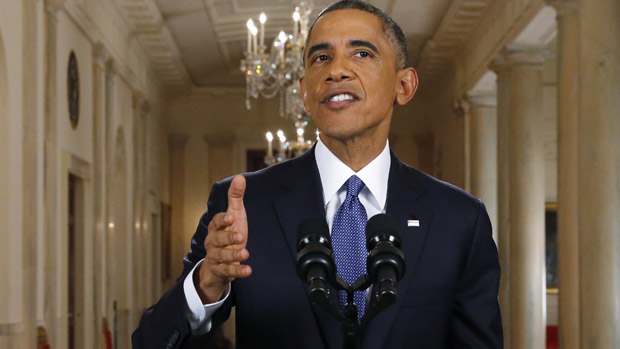Executive orders: how a US president can rule by decree
Republicans say Obama's immigration rules are illegal and should be overturned, but executive orders have a long history

A free daily email with the biggest news stories of the day – and the best features from TheWeek.com
You are now subscribed
Your newsletter sign-up was successful
Barack Obama has ordered some of the most sweeping changes to the US immigration system in decades with a raft of measures that will allow millions of undocumented immigrants living in the US to stay in the country, but Republicans have accused the president of acting illegally.
The changes were ushered in without the consent of Congress through what is known as an "executive order". In a prime time address to the US public, Obama said that alongside the new provisions, he would bolster border security making it harder for illegal immigrants to reach the country.
What is an executive order?
The Week
Escape your echo chamber. Get the facts behind the news, plus analysis from multiple perspectives.

Sign up for The Week's Free Newsletters
From our morning news briefing to a weekly Good News Newsletter, get the best of The Week delivered directly to your inbox.
From our morning news briefing to a weekly Good News Newsletter, get the best of The Week delivered directly to your inbox.
Orders directly from the president have been used by US leaders since George Washington in 1789 to help officers of the executive branch to manage the operations of the federal government. The instructions only became known as executive orders in 1862 under Abraham Lincoln, according to the American Presidency Project.
Today an executive order is defined as "a directive issued to federal agencies, department heads or other federal employees by the President of the United States under his statutory or constitutional powers", explains Robert Longley, on the website About.com. "In many ways, presidential executive orders are similar to written orders, or instructions issued by the president of a corporation to its department heads or directors."
How do they work?
An executive order comes into force 30 days after it has been issued by the president. Once it is made, the president can choose to amend or retract it at any time. Incoming presidents also have the choice either to maintain or abolish the orders of their predecessors.
A free daily email with the biggest news stories of the day – and the best features from TheWeek.com
Orders deemed to be in violation of the US Constitution it can be struck down by the Supreme Court. In 1935, five orders made by Franklin Roosevelt were overturned, says Bloomberg's David Knowles. Harry Truman had his order to seize steel mills during a labour strike struck down in 1935, and Bill Clinton's 1995 decree preventing the government from employing organisations that employed strike-breakers was also overturned by the court.
Why are they used?
Executive orders have three specific purposes:
- to manage the government's executive branch – the part of the government that consists of the president, the vice president and the 15 Cabinet-level executive departments.
- to manage federal agencies and officials
- to carry out constitutional or presidential responsibilities
Which presidents have used them?
All US presidents have used executive orders. In 1941 Franklin D Roosevelt issued Executive Order 9066 in the wake of the Japanese attack on Pearl Harbour, which allowed for the internment of 120,000 Japanese Americans. After the attacks on the World Trade Center on 11 September 2001, George W Bush issued an order that combined 40 separate law enforcement agencies and created the cabinet-level Department of Homeland Security.
What will Obama's order on immigration do?
Up to five million undocumented parents of children who are either US citizens or legally allowed to work in the US will be given the opportunity to apply for permits to stay and work in the US for up to three years. People who arrived in the US as children will also be given temporary legal status under the scheme, the BBC reports.
What do Republicans say about the order?
Republicans are "slamming Obama's use of executive authority as a mammoth presidential power grab", says CNN.
According to Forbes's Jim Powell, many political analysts regard executive orders as only quasi-legitimate. "Many executive orders are in a twilight zone of dubious constitutional legitimacy if not open defiance of the Constitution, especially when they amount to lawmaking without congressional approval", Powell says.
Senator Rand Paul says that Republicans are pinning their hopes on the Supreme Court to overturn Obama's order, but according to Bloomberg, most conservative legal scholars are not optimistic that the order will be struck down.
Christopher Schroeder, a law professor at Duke Law School, said: "I agree [these powers] can make us very uncomfortable. I just don't see the argument for unconstitutionality at this juncture."